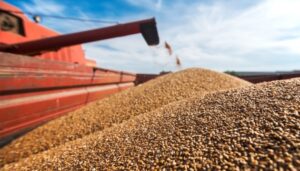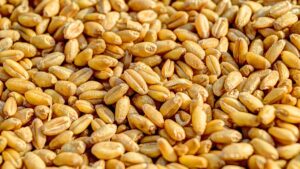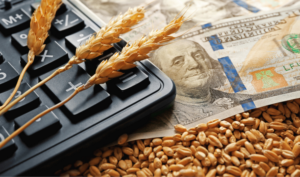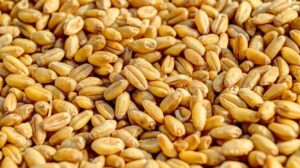
Ukraine exported in 2022/2023 marketing year (from July 1, 2022 to June 30, 2023) 48.996 million tons of grain and leguminous products, which is 641 thousand tons more than in 2021/2022 MY, said the press service of the Ministry of Agrarian Policy and Food.
During the previous marketing year, Ukraine exported 48.355 million tons of grain and leguminous products, in particular: 18.72 million tons of wheat, 5.747 million tons of barley, 161.5 thousand tons of rye and 23.409 million tons of corn.
It is noted that in 2022/2023, as of June 30, Ukraine reduced exports of wheat by 10.6% – to 16.836 million tons, barley by 52.9% – to 2.704 million tons, rye by 88.9% – to 18 thousand tons, but increased supplies of corn to foreign markets by 24.4%, which reached 29.128 million tons.
According to the report, Ukraine increased exports of all major export items of agricultural products in June 2023, in particular, 2.9 times the supplies to foreign markets of cereals and leguminous plants increased and reached 3.658 million tons. Export of wheat increased by 10.9 times – to 1.338 million tons of wheat (last June – 122 thousand tons), barley – 1.8 times – to 57 thousand tons, corn – twice – to 2.257 million tons.
Ukraine did not export rye in June 2023 and in June last year.
Since the beginning of 2022/2023 MY, Ukraine exported 153.6 thousand tons of flour, which is 2.2 times more than a year earlier, when exports were 70.7 thousand tons.
According to the Ministry of Agrarian Policy, Ukraine exported more than 22.5 million tons of grain in January-May 2023, including more than 14.3 million tons of corn, more than 7.2 million tons of wheat and more than 977 thousand tons of barley.

The grain harvest in Ukraine this year is expected to be about 46 million tons, which is 5-7% less than last year, said First Deputy Minister of Agrarian Policy and Food Taras Vysotsky.
“As of today, there is a weighted average forecast: it is expected that the grain will be harvested about 46 million tons. This, unfortunately, is less than last year. The decrease is about 5-7%,” he said on national telethon Monday.
At the same time, Vysotsky noted that domestic consumption of grain is 18 million tons.
“Therefore, even collecting 46 million tons, it is still 2.5 times more than the domestic need, respectively, there is no risk for shortage of grain for domestic purposes today,” – said the first deputy minister.
As previously reported, in mid-March, the Ministry of Agrarian Policy predicted a reduction in the total gross yield of grain and leguminous crops in the season of 2023 to 44.3 million tons against 53.1 million tons in the previous season.

Nibulon” JV LLC (Mykolaiv), one of the largest operators at the grain market of Ukraine, in January-June 2023 transported by its own fleet from the branch “Bessarabskaya” (Izmail) to Constanta, Romania about 80 thousand tons, or 15% of the total shipments of the company during this period.
According to the grain trader’s website, this was made possible by the redeployment of the fleet from Nikolaev, which involved disassembly of the vessels, their transportation by land to the Danube and their subsequent reassembly at the Bessarabian branch. In total two port tugs “Nibulon-12” and “Nibulon-14”, tugs “Nibulon-3” and “Nibulon-11” and two handling machines Terex Fuch mhl 385 were transported this way.
The announcement indicates that the Nibulon also began providing tug, mooring and unmooring services for vessels on the Danube. In January-June 2023, the number of hours worked in this way increased 18-fold.
“In the spring, Nibulon was able to resume shipping on the Middle Dnieper. Now tugs “Nibulon-10”, “Hermes-2” and non-self-propelled barges UAK-1, UAK-2, UAK-3, UAK-4 work here, and the branch “Kremenchugskaya” acts as a central transshipment hub that receives grain from water transport and reloads it into the cars”, – stressed the press service of grain trader and added that during April and May 2023 more than 15 thousand tons of grain were transported this way.
It is noted that the shipping company of the grain trader plans to increase the volume of services to third parties in Ismail, as well as to increase the volume of traffic to Constanta by optimizing the routes.
“The experience of sea routes in winter and spring allows the company to choose exactly sea routes instead of the Danube, which affects the speed of the fleet,” summarized the “Nibulon”.
JV Nibulon LLC was founded in 1991. Before the Russian military invasion, grain trader had 27 transshipment terminals and complexes to receive the crops, the capacity for one-time storage of 2.25 million tons of agro products, a fleet of 83 ships (including 23 tugs) and owned the Nikolayev shipyard.
“Nibulon” before the war worked 82 thousand hectares of land in 12 regions of Ukraine and exported agricultural products to more than 70 countries.
The grain trader exported a maximum of 5.64 million tons of agricultural products in 2021, reaching a record volume of deliveries to foreign markets in August – 0.7 million tons, the fourth quarter – 1.88 million tons and in the second half of the year – 3.71 million tons.

Minister of Agriculture and Rural Development of Romania Florin Barbu intends to ask the European Commission to extend restrictions on imports of agricultural products from Ukraine until the end of the year and expand the list of banned for the import of agricultural products.
“The ban is valid until September 15. I will hold a discussion with my colleagues from other countries, and we will ask for an extension until December 31. In addition to rapeseed, wheat, corn, sunflower, I will try to add up to 10 more products,” Euractiv quoted Barbu as saying in the Romanian Parliament on Wednesday.
He said the list of import bans could include honey and meat, as well as “other Romanian priorities so that farmers can sell local products.”
As reported, the EU ban on imports of wheat, corn, rapeseed and sunflowers from Ukraine came into force on May 2 and replaced unilateral decisions to ban imports by countries bordering Ukraine, particularly Poland, Bulgaria, Hungary and Slovakia, in violation of the Association Agreement and EU internal regulations as of April 28.
As noted by the EU, Bulgaria, Hungary, Poland and Slovakia undertook to cancel unilateral measures on these and all other types of agricultural products originating from Ukraine, as well as to allow free transit.
On June 5, the European Commission extended until September 15 restrictions on imports of wheat, corn, rapeseed and sunflower seeds from Ukraine to Bulgaria, Hungary, Poland, Romania and Slovakia, considering that the problems provoked by such imports have not yet been overcome. The new regulations do not allow these grains and oilseeds to be supplied to the markets of these countries under contracts concluded before May 2.
Romania was the only one of the five frontline countries that did not impose a ban on imports of Ukrainian agricultural products before the official decision of the European Commission.

JSC “Ukrzaliznytsia” (UZ) in May 2023 transported 1836 thousand tons of grain cargo, which is 33% less than a month earlier, said deputy director of the department of commercial work UZ Valery Tkachev at a meeting with representatives of agrarian business on Thursday.
According to his information 1147 thousand tons of grain cargo were sent for export last month, which is 46% less than in April. In domestic communication 683 thousand tons were transported, which is 16% less than in April. Average daily loading in May was 44 thousand tons.
“Two factors influenced the reduction of transportation – the blocking by the aggressor of the “grain corridor”, which affected the delivery of goods by rail to ports, as well as the blocking of exports through “solidarity corridors” by European countries, which led to a halving of cargo handling through the western borders of Ukraine”, – explained Tkachev.
He added that UZ is ready to increase transportation, for which it has sufficient resources.
According to the operational data of UZ, in the first week of June 2023 the volume of grain cargo loading was 380 thousand tons, or 15% of the total cargo. Average daily volumes of transshipment during this period amounted to 54 thousand tons, which is 2.2 times higher than in April.
According to Tkachev, the actual average daily volume of agricultural cargo transshipment through the border crossings in June 2023 increased by 90 cars compared to May. Grain cargo increased by eight cars per day.
A UZ representative said that 9,740 railcars, of which 1,084 railcars with grain cargoes, are heading toward the western border. The queue for agricultural commodities has decreased by 343 cars (24%).
“Wagon congestion is ‘dissipating,’ thanks to the balancing of border loads. As long as the grain corridor works, the load on the western borders is reduced. Also transfer through European countries became more active”, – UZ representative explained.
Speaking about the transshipment of grain at the Ukrainian-Polish border, Tkachev said that in May at the checkpoint “Yagodin-Dorohusk” average daily passed 17.3 cars with grain, crossing “Izov-Grubeshov” – 20 per day, crossing “Mostiska-Medica” – 22.13 per day. At the Romanian BCP “Vadul-Siret-Dornesti” average was 47.7 w/c with grain, BCP “Dyakovo-Halmeu” – 8.5 w/c.
At the Ukrainian-Hungarian border, grain cargo transshipment in May at BCP “Chop-Zakhon” was 39.5 per/c, at BCP “Bat’ovo-Betereshki” in May transshipment of 25.6 per/c was recorded, the maximum rate in May – 93.9 per/c.
“For all Western BCPs, if we analyze the statistics of the last five months, there is a sagging of shipments from one and a half to five times. The remaining restrictions on exports with the permission of transit significantly affect the export of grain through the western borders,” – summarized Tkachev.
The head of UZ reported that, as of June 8, 2023 in the direction of the ports of Greater Odessa moves 2663 railcars with grain cargo. The average daily unloading in June is 493 cars with grain. Unloading waiting time (queue) is 4.9 days.
As of June 8, 1,656 railcars with grain cargo are bound for Port Ismail. Since May 29, the queue decreased by 23.48%. The average daily unloading for June was 122 grain cars. Unloading waiting time (queue) reaches 11.3 days.
“The work of the “grain corridor” today is difficult to predict, the aggressor country constantly changes the number of inspections of ships and puts forward different requirements, in addition the work of the port “Southern” is blocked. The situation in the port of Izmail remains difficult because of the large accumulation of cars. Loading in the port direction is planned taking into account the processing capacity of consignees/operators, but due to weather conditions they unload significantly less than planned volume,” UZ noted.

Ukrainian Agribusiness Club (UCAB) considers the continuation of the restrictive measures on import of wheat, corn, rapeseed and sunflower from Ukraine to Poland, Hungary, Slovakia, Romania and Bulgaria discriminatory and groundless and insists on the cancellation of this decision.
“Such prolongation will neither solve the problems of local markets nor improve the situation of local farmers,” said a statement published on the UCAB website on Monday.
The business association believes that the resolution prepared by the EU on the prohibition of the import of agricultural products from Ukraine to five neighboring EU countries, according to which the restrictions will be in force until September 15 this year, will have a negative impact on the economic recovery of Ukrainian farmers during the war.
Such decisions should be taken only after detailed studies and consultations with all EU member states because according to the latest data, some neighboring EU member states, such as Poland, were able to increase their export potential and domestic processing by importing cheaper Ukrainian agricultural products and improve their positions in livestock and finished products, the UCAB reminded.
The business association noted the negative influence of such a decision on the situation with sabotage of the “grain agreement” by Russia. “According to preliminary forecasts, the current steps to prohibit the import of Ukrainian agricultural products to the EU may deepen the blackmailing of the Russians regarding the operation of the grain corridor,” the UCAB said.
Experts of business-association emphasized that Ukraine will have less export potential in 2023 season: export of grains and oilseeds from Ukraine is forecasted to decrease by one third to 46 million tons per year.
Existing trade restrictions on Ukrainian agricultural products in five countries of the EU should be abolished. At the same time, it is worth conducting an open constructive dialogue between representatives of the Ukrainian and European agro-communities in order to find compromises, which will help both the EU and Ukraine to become stronger, summed up in UCAB.